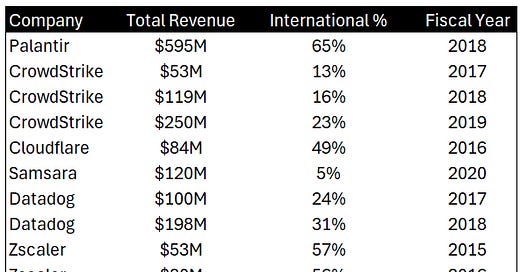🌎Playbook for International Expansion
How to think about growing revenue internationally & the complexities of international hiring
Today’s Sponsor:
Want to see how advanced technologies, like AI, can power your business? Download this roadmap to uncover how CFOs are using AI to uncover deeper insights, faster.
Expanding Internationally
Every high-growth tech company will eventually need an international expansion strategy. This post will cover two of the main considerations:
Capturing international market/revenue
Creating a global workforce
I will provide my thoughts/experience with #1 and how companies should think about international revenue. Then I have asked Job van der Voort and Marcelo Lebre (from Remote) to cover #2 because they are the experts on creating global workforces and the complexities involved.
👉Offshore talent plug: Speaking of internationally hiring….I am partnered with OnlyExperts if you are looking for offshore finance/accounting. Get 20% off by mentioning I sent you.
International Revenue Benchmarks
Let’s start with some benchmarks to understand what everyone else is doing. I have two sets of international revenue benchmarks:
Public company international revenue % when they went public (with some subsequent years to show how it changed)
Private company international revenue benchmarks, which shows earlier stage companies.
Public Company Benchmarks
Private Company Benchmarks
Here are a few thoughts from the data:
Some companies prioritize international a lot sooner than others.
Regulated industries and vertical software have a much harder/slower time going international. Bill.com and Toast (heavy regulated fintech) still have very little international revenue and had zero at the time of their IPOs.
There is no right answer to when and how to go international. Companies can often scale fast in just the U.S. market. But eventually most will have to go international.
Planning for International Growth
Lots of money and time can be wasted by prematurely going international. For many companies it feels like a badge of honor to open up an international sales offices and go after the global opportunity.
More opportunities from expanding internationally means more revenue right?
Not necessarily. I have seen companies enter international markets prematurely and burn a lot of money trying to establish the GTM playbook.
And even worse than the cash burn is the time and focus that the international expansion takes. International expansion can be incredibly distracting. Lots of conversations, management attention, sales focus, etc.
When done right, international expansion can unlock huge growth opportunities, but the decision needs to carefully consider:
When to do it
How to do it
You can only focus on so many things and do them well. You can hire more people but there is a limitation on leadership. Expanding internationally is a BIG decision that needs careful consideration.
While there is no single right answer, in my opinion the international pull (international prospects pulling you into deals by contacting you) should be pretty strong before deciding to dedicate resources to an international location. Where I usually see international expansion go wrong is when companies push into international locations in an attempt to accelerate slowing growth.
The U.S. market for most companies is huge. If you aren’t being pulled into international markets, then consider why not first. Maybe the slowing growth rates is indicative of a deeper problem that needs to be fixed first.
Take a crawl, walk, run approach.
Crawl: Let the inbound and international customers build a bit first. If a company has product/market fit then there will be international pull. If there is no pull then maybe there is a product/market fit issue. Have your local sales reps take international locations (find ones that speak the foreign language if applicable and/or that can work those time zones)
Walk: After being pulled into a market ($2M+ revenue) then consider setting up minimum viable GTM team. At $2M of revenue there is probably enough activity to keep that small group busy and efficient.
Run: Build and run the GTM playbook.
Don’t run before you walk. And having the right people is critical during the walk and run stage.
Building a Global Hiring Plan
I have enough experience hiring internationally to know that it can get complex fast and there is a lot of grey in how it should be done. The lawyers will tell you one thing and practically many people do something a bit different. It’s all a matter of business risk.
While I have done a lot of international hiring in my past, I am no expert. So I asked the co-founders of Remote, Job van der Voort and Marcelo Lebre to give a high-level overview of some of the questions, risks, and other things companies should be considering when hiring internationally.
A guest post by Job van der Voort and Marcelo Lebre, co-founders of Remote
Companies are often held back from employing great people due to geographical and compliance challenges, whether in another state or across the world. By hiring globally and tapping into diverse talent pools, companies gain multiple benefits, while fostering innovation and growth.
However, navigating international hiring requires meticulous planning and understanding of various complexities, from country-specific legal frameworks to cultural nuances and tailored benefits packages. Here’s what you need to know.
Deciding on Countries to Hire In
Selecting the right countries to expand your workforce is crucial. Consider factors such as:
Market potential: Assess economic stability, growth prospects, and market demand for your products or services.
Talent availability: Research skills availability and talent competitiveness in target regions based on open roles.
Legal and regulatory environment: Evaluate labor laws, taxation policies, and compliance requirements.
Setting up Compensation Structure Internationally
Creating a competitive and compliant compensation structure involves:
Market research: Benchmark salaries against local standards and industry norms.
Tailored benefits packages: Include mandated benefits like healthcare, retirement plans, PTO & paid leave, paternal leave, and overall total rewards compensation.
Currency considerations: Manage currency fluctuations and exchange rates to ensure salary consistency and fairness.
Challenges and Considerations
Hiring employees internationally brings undeniable benefits but also unique challenges. Setting up local operations involves understanding diverse tax, contract, and HR laws, which vary widely by country. Compliance with local employment regulations is crucial but complex and costly, requiring either local HR teams or reliable global partners. Paying international employees adds another layer of complexity due to different currency regulations and payment methods.
Several factors can complicate international hiring and should be carefully managed:
Termination laws: Understand termination regulations, notice periods, and severance pay requirements, which vary widely across countries.
Additional costs: Factor in extra expenses such as mandatory 13th or 14th-month salaries (e.g., Greece), and employer social security contributions.
Compliance complexity: Navigate local compliance requirements for taxes, benefits, and employment regulations.
Contractor vs. Employee: Determine when to hire contractors, use Employer of Record (EOR) services, or establish a legal entity based on local laws and business needs.
Hiring Contractors vs. Employees
As companies increasingly adopt remote work and expand globally, understanding local hiring regulations is crucial, especially distinguishing between employees and contractors in each new market.
Misclassification occurs when individuals are mistakenly labeled as contractors rather than employees, denying them employee benefits and protections despite functioning in an employment-like relationship.
Without a dedicated HR or legal team, the burden of compliance can make the idea of hiring international contractors seem overwhelming — but with the right partner and knowledge, it can be a straightforward process. Contractors are particularly advantageous for startups that are experiencing rapid growth, require specialized services, and need a high level of flexibility. On the other hand, remote employees should be viewed as long-term partners who contribute to the foundational growth of your company.
Additional Cost When Hiring in New Countries
Internationally, hiring expenses can increase due to mandated employment taxes, which can push total costs to 1.25 to 1.4 times the employee's salary. For example:
A software engineer in Argentina with a $60,000 salary incurs an additional $15,731.76 in employer costs.
A 3D artist in Singapore at a $40,000 salary requires an extra $6,897.24.
A product manager in Belgium earning $102,000 adds $26,384.64 annually for benefits required by local and EU regulations.
Navigating global costs can be complex, but HR platforms like Remote streamline the process with remarkable efficiency.
Implementing Your International Hiring Plan
Building an international team is a strategic endeavor that requires foresight, planning, and compliance with local regulations. Tools like Remote’s free Employee Cost Calculator will help you quickly understand the total cost of employment so you can build a strong, fully-compliant global compensation policy while controlling costs. Your strategy for employing international hires will depend on your short-term requirements and the long-term goals of your business.
You can skip the complexities by partnering with Remote, our all-in-one HR solution. You save time and enhance employee experience with one streamlined view of benefits, onboarding, payroll, and more. Plus you get our local experts' knowledge of laws, culture, and expectations for seamless compliance, payroll, onboarding, and benefits management.
Talent is everywhere. In 2019, we set out to help companies like yours overcome the barriers to hiring amazing people. In just five years, we have scaled to 1,500 employees and now serve tens of thousands of customers worldwide. We’re ready to support and scale your growth with our easy-to-use HR platform, so you can hire and pay anyone, anywhere.
Get started with a personalized session - we would love to help you!
Footnotes:
Check out OnlyExperts if you need offshore accountants. I am partnered with them to help CFOs and finance teams hire better finance talent for less.
Download NetSuite’s guide on how CFOs are using AI






